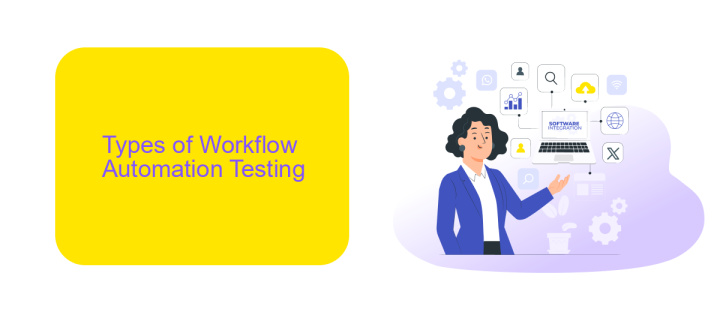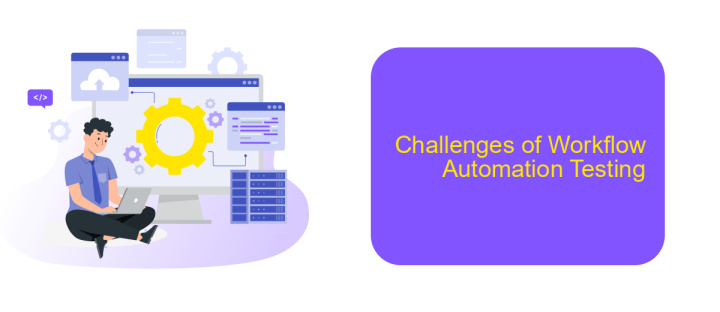Workflow Automation Testing
Workflow automation testing is a critical process in modern software development, ensuring that automated systems function seamlessly and efficiently. By rigorously testing workflows, organizations can identify and rectify potential issues before they impact productivity. This article delves into the key methodologies, tools, and best practices for effective workflow automation testing, providing insights to enhance your testing strategies and improve overall system reliability.
Introduction
Workflow automation testing is an essential process for ensuring that automated workflows function correctly and efficiently. By automating repetitive tasks, businesses can save time, reduce errors, and increase productivity. However, to achieve these benefits, it is crucial to rigorously test the automation workflows to ensure they perform as expected.
- Identify the key processes that need automation.
- Set up automated workflows using tools like ApiX-Drive.
- Develop test cases to validate each workflow step.
- Execute tests and monitor the results for any discrepancies.
- Continuously refine and optimize workflows based on test outcomes.
Services like ApiX-Drive facilitate the integration of various applications and systems, making it easier to automate and test workflows. By leveraging such tools, businesses can ensure seamless data transfer and process automation, ultimately leading to more efficient operations. Proper testing of these workflows is paramount to maintaining the integrity and reliability of automated processes.
Types of Workflow Automation Testing

Workflow automation testing can be categorized into several types, each focusing on different aspects of the workflow process. Functional testing ensures that the automated workflow performs as expected by verifying each function of the software application. Performance testing evaluates the speed, responsiveness, and stability of the workflow under various conditions, ensuring that it can handle the expected load without issues. Security testing is crucial to identify vulnerabilities within the automated workflow, ensuring that data is protected against unauthorized access and breaches.
Integration testing is another critical type, which verifies that different systems and components work together seamlessly within the automated workflow. Tools like ApiX-Drive facilitate this by providing robust integration capabilities, allowing various applications to communicate and function together efficiently. Usability testing focuses on the end-user experience, ensuring that the automated workflow is intuitive and easy to use. Regression testing ensures that new updates or changes do not disrupt the existing workflow, maintaining its integrity over time.
Benefits of Workflow Automation Testing

Workflow automation testing offers numerous advantages that significantly enhance the efficiency and effectiveness of software development processes. By automating repetitive tasks, teams can focus on more critical aspects of their projects, leading to better outcomes and faster delivery times.
- Increased Efficiency: Automation reduces the time spent on manual testing, allowing for quicker identification and resolution of issues.
- Consistency and Accuracy: Automated tests run consistently, eliminating human error and ensuring reliable results every time.
- Cost Savings: By reducing the need for extensive manual testing, companies can save on labor costs and allocate resources more effectively.
- Scalability: Automated testing can easily scale to accommodate larger projects, making it ideal for growing businesses.
- Enhanced Integration: Tools like ApiX-Drive facilitate seamless integration with various services, streamlining the workflow and improving overall productivity.
Implementing workflow automation testing not only boosts productivity but also ensures a higher quality of software. By leveraging modern tools and technologies, teams can achieve more reliable and efficient testing processes, ultimately leading to better software products and satisfied customers.
Challenges of Workflow Automation Testing

Workflow automation testing can present several challenges that need to be addressed to ensure seamless operations. One of the primary issues is the complexity of workflows themselves, which often involve multiple systems and integrations. This can make it difficult to create comprehensive test cases that cover all possible scenarios.
Another significant challenge is the dynamic nature of workflows. Changes in one part of the system can have cascading effects on other components, making it crucial to continuously update and maintain test scripts. Additionally, ensuring data consistency and integrity across various stages of the workflow adds another layer of complexity.
- Managing diverse integrations and APIs
- Maintaining test scripts for dynamic workflows
- Ensuring data consistency and integrity
- Handling large volumes of test data
- Dealing with asynchronous processes
To address these challenges, leveraging tools like ApiX-Drive can be beneficial. ApiX-Drive simplifies the integration process, allowing for easier management of APIs and ensuring that different systems communicate effectively. This can significantly reduce the complexity involved in workflow automation testing, making it more manageable and efficient.


Best Practices for Workflow Automation Testing
Effective workflow automation testing begins with a clear understanding of the processes and objectives. Start by outlining the workflows you aim to automate and test, ensuring each step is well-documented. This initial phase is crucial for identifying potential bottlenecks and areas for improvement. Utilize tools that allow for detailed process mapping and analysis, as these will provide a solid foundation for your testing strategy.
Integration is key to successful workflow automation. Employ services like ApiX-Drive to streamline the integration of various applications and platforms within your workflow. This will not only enhance efficiency but also ensure that your automated processes are seamlessly connected. Regularly update and maintain these integrations to prevent disruptions. Additionally, continuous monitoring and iterative testing are essential to adapt to changes and ensure your workflow automation remains effective over time.
FAQ
What is workflow automation testing?
Why is workflow automation testing important?
How can I get started with workflow automation testing?
What are some best practices for workflow automation testing?
Can workflow automation testing be integrated with other systems?
Time is the most valuable resource in today's business realities. By eliminating the routine from work processes, you will get more opportunities to implement the most daring plans and ideas. Choose – you can continue to waste time, money and nerves on inefficient solutions, or you can use ApiX-Drive, automating work processes and achieving results with minimal investment of money, effort and human resources.

